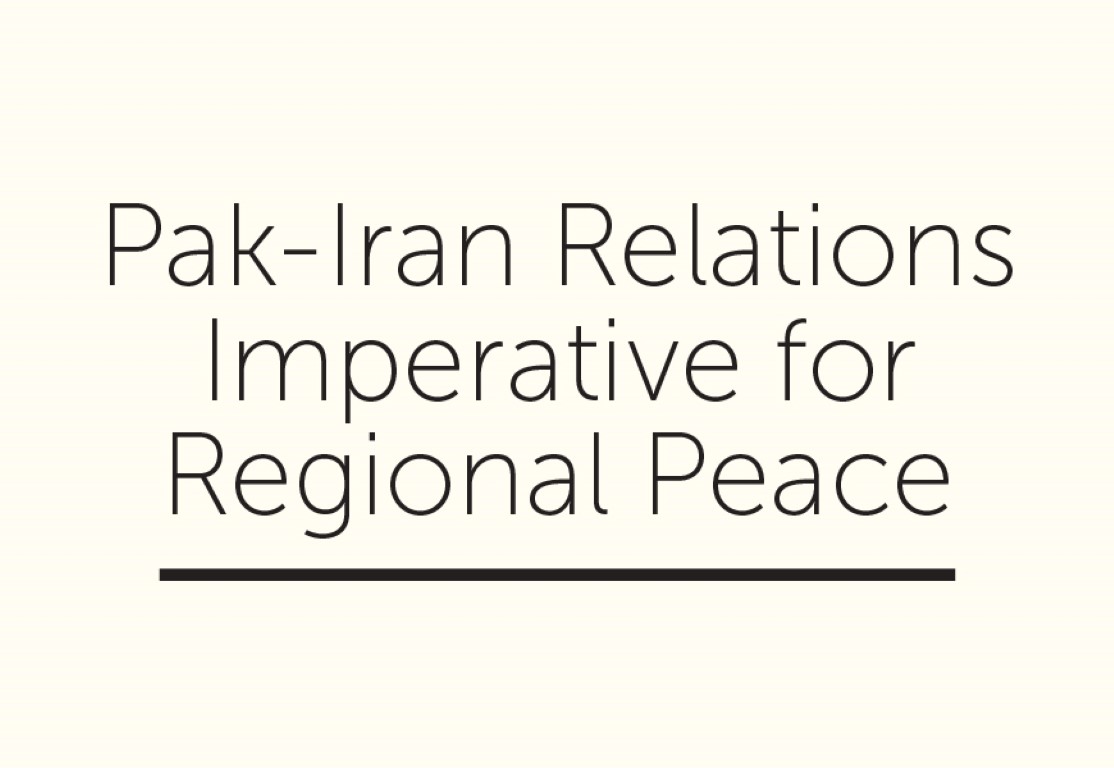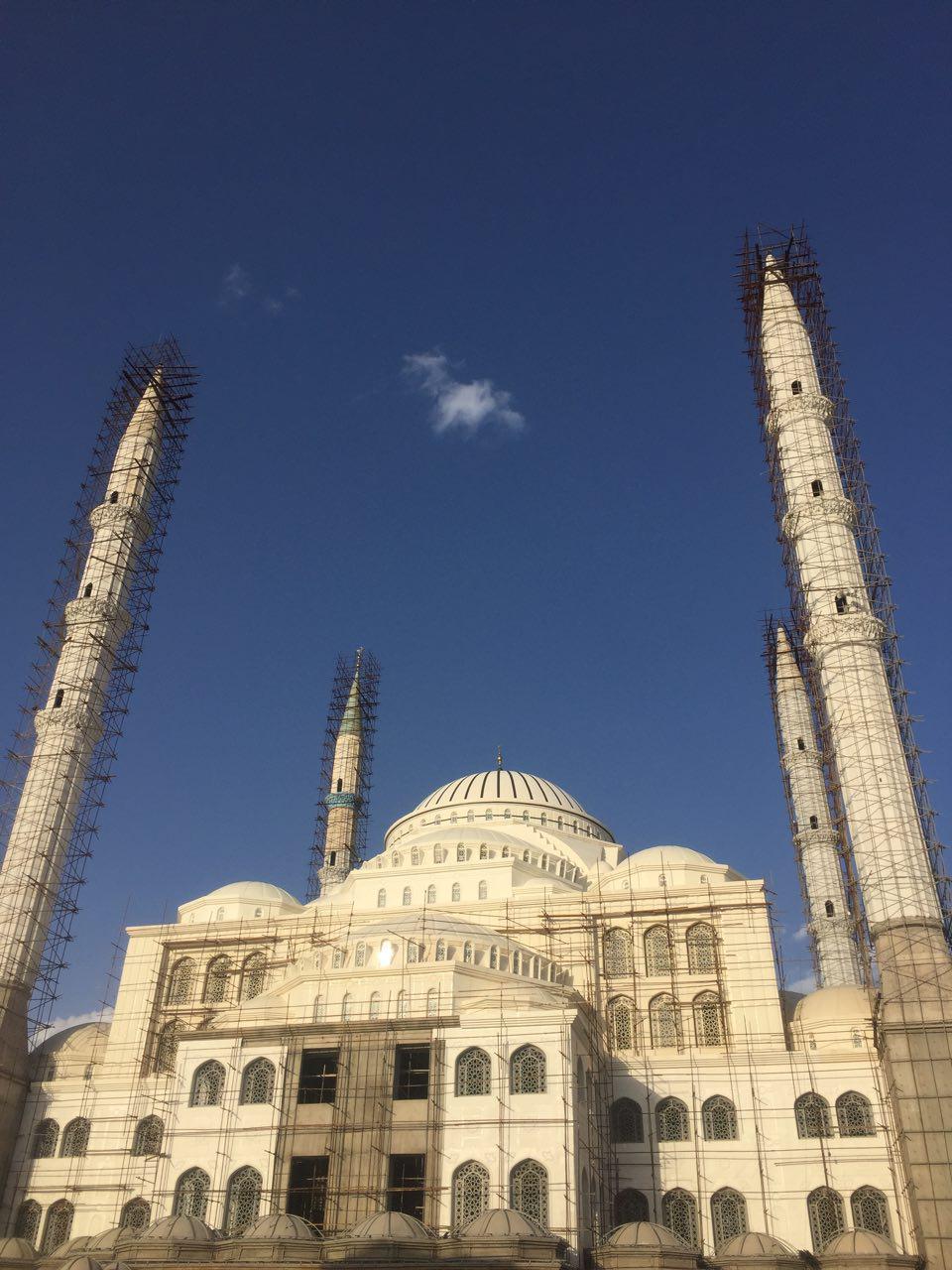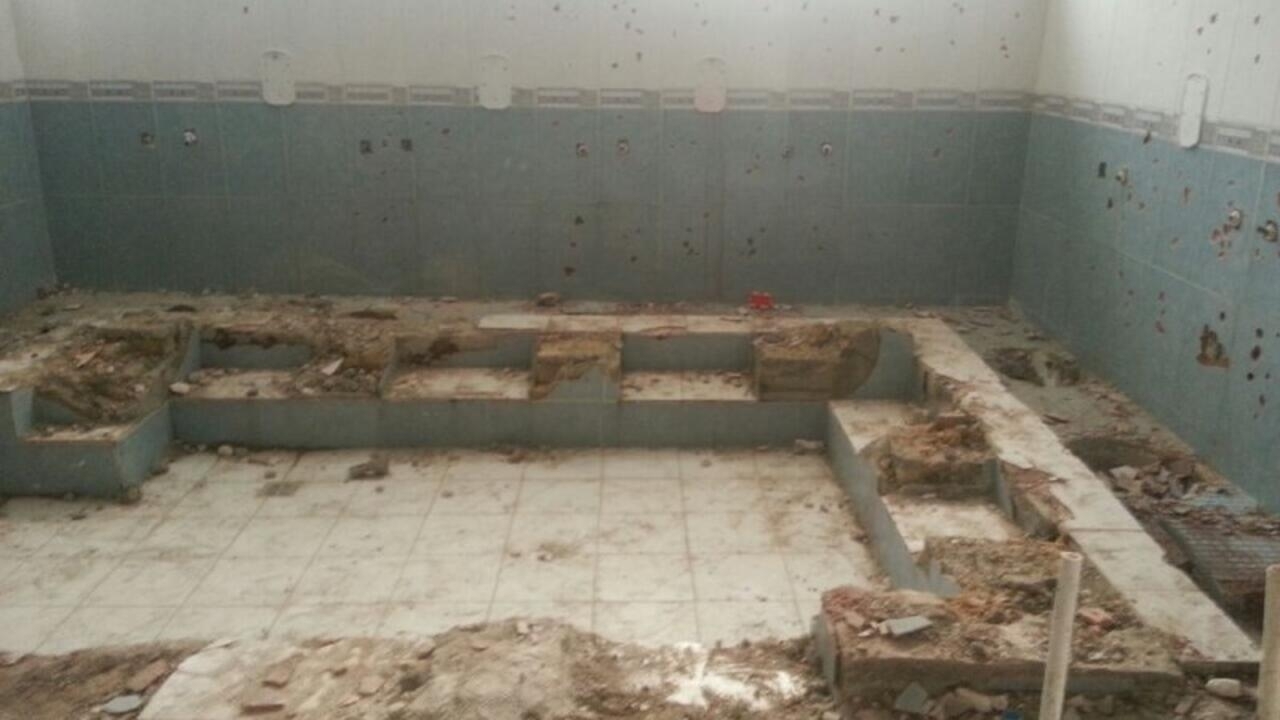Pakistan, since 9/11, has faced the dilemma of balancing the relationship with Saudi Arabia and Iran. Iran is not only an important country in the Gulf, but is also a stakeholder in regional peace, especially the Middle East.
Pakistan shares a tri-functional border with Iran; direct land border with Iran’s Sistan Province, maritime boundary of Makran Coast commencing from Sindh, and, through Nimruz province of Afghanistan, which was called “the scariest little corner of the world” by Luke Mogelson, a contributing writer at The New York Times Magazine. However, the reality is not that scary. Since centuries there have been many ethnic, historical tribal and socio-political compositions of people living across the borders of the three countries: Pakistan, Iran and Afghanistan.
Pakistan-Iran Relations
Pakistan and Iran had friendly relations post partition of the subcontinent. Iran was amongst the foremost countries to recognize Pakistan and even supported Pakistan in the 1965 and 1971 wars against India. However, post Iranian revolution in 1979 that also has a sectarian profile, and Islamabad’s convergence with Riyadh and alliance with Washington in the Afghan War makes the relationship between the two countries a little complex.
Iran is being categorized by the West as the world’s most complex foreign relations dilemma. Since the revolution, the West has had troubled relations with Iran. However, it remains a very important country in the 21st century because of its resources, ideology, weaponry, allies and location, says Robin Wright, a New York based expert on Iran. Iran holds 10 percent of the world’s oil resources, it is Organization of the Petroleum Exporting Countries (OPEC)’s third-largest oil producer, and has the fourth-largest oil reserves and second-largest gas reserves of the world, which gives Iran enormous leverage in an energy starved global community.
Iran’s geostrategic location is also very significant: it is a bridge between the world’s most volatile blocs. Peaceful relations with Iran are a pre-requisite for stability in more than twelve countries spanning over the Middle East to the West, the Asian subcontinent to the east, and Central Asia and Caucasus to the north.
Pakistan’s focus on India and Afghanistan makes Iran a very important country, both geo-economically and geostrategically, with whom it shares more than 900 kilometers border. The relationship has seen its share of ups and downs.
The Security Front
Tehran was not pleased with Islamabad’s decision to let the former Army Chief General Raheel Sharif (R) lead the Saudi-organized Islamic Military Alliance to fight terrorism in 2017. Iran continues to point fingers at Pakistan of supporting or going easy on insurgents infiltrating the Iran-Pakistan border and allegedly harboring militant group, Jaish al-Adl (Army of Justice). Similarly, Pakistan has raised questions especially after Kulbhushan Jadhav’s arrest and his involvement in acts of terrorism in Pakistan. Recent killing of security personnel on the Coastal Highway terrorist act and fleeing of terrorists back to Iran raised issues as conveyed by Pakistan’s Foreign Minister Shah Mahmood Qureshi.
The lowering tensions between Pakistan and Iran has more than just a bilateral dimension, it is intrinsically linked to Chinese investment in Balochistan; the frontline province for CPEC and Belt and Road Initiative (BRI). Despite a very complicated backdrop, and the fact that two allies of Pakistan i.e., United States and Saudi Arabia are against Iran, it is very important for Pakistan to balance its relationship not just between Riyadh and Tehran, but also between Beijing and Washington. Similarly, it is important for Iran to improve its relations with Pakistan and use this link to improve ties for better regional peace prospects.
The Saudi-U.S. nexus is seen with skepticism by both Tehran and Beijing, and unfortunately, Pakistan has to brace for negative fallout with Iran loosening its grip on the operations of Baloch nationalist groups, such as Baloch Liberation Front and Baloch Liberation Army, which have presence in Sistan and Baluchestan on the Iranian side of the Pakistan border. The Ormara attack was seen by many as a reaction by Iran to the Sunni militant action against the Hazaras.
Pakistan also has serious concerns about Iran being used as transit route for terrorism in Pakistan, and more importantly, Iran’s inaction against ethnic Baloch separatist groups. However, instead of relations between Iran and Pakistan souring further following the execution of 14 people in Balochistan province of Pakistan, pragmatism has brought the two nations closer together. The response of Prime Minister Imran Khan and the Iranian leadership was rooted in finding solutions and pledging support instead of falling in the usual blame game pattern.
All of this has direct repercussion for Chinese investments in Balochistan. It is crucial for Pakistan to take actions to improve the security situation of the Balochistan province by improving bilateral security mechanisms on the border with Iran. Border fencing and the creation of Joint Rapid Reaction Force are all measures geared towards exactly that end. The highlight of the visit is moving the relationship from negative finger-pointing construct to positive, resolution-oriented approach. The creation of Joint Rapid Reaction Force along the shared border of Iran and Pakistan is a landmark achievement. However, the news may infuriate some major players on the world stage.
This is a leap away from the traditional approach where Pakistan and Iran were hostage in the hands of those who saw the consolidation of relations between Tehran and Islamabad with skepticism. The security trajectory seems to have taken the right direction.
Economic Front
PM Khan’s visit coincided with tightening of sanctions on Iran by the Trump administration to strangulate Tehran economically and undercut its powers across the Middle East. Therefore, the way forward on the economic front remains an uphill task, largely because of anti-Iran U.S.-Saudi nexus. The PM’s visit unfortunately coincided with Mike Pompeo’s announcement of clamping down on countries that export oil from Iran, including China which accounts for about half of Iranian oil exports, to bring oil profits for Iran to zero.
Trump’s decision to reimpose sanctions on Iran and penalize capitals for doing business with Tehran is clouding the viability of Iran-India-Afghanistan Chabahar project. Moreover, Afghanistan’s economy which largely relies on remittances flowing in from Iran (68 percent) will be affected. According to United Nations High Commissioner for Refugees report, Iran is home to 3 million Afghan refugees, who will also suffer because of the decision to reimpose sanctions.
Iran's currency, the Rial, has depreciated in comparison to Afghani and is at record lows against the U.S. dollar, which is widely used in Afghanistan. For Pakistan, the functioning of multi-billion dollar Iran-Pakistan (IP) gas project is also hostage to U.S. sanctions and there has been no progress on the project despite Pakistan’s acute energy shortage. The IP gas pipeline project is now virtually shelved because of reimposition of sanctions on Iran.
Besides economic repercussions, sanctions on Iran are also one of the biggest impediments to the peace initiative in Afghanistan. The presence of the U.S.-led NATO/ISAF forces has already restricted Iran’s contribution to Afghanistan and has left little room for defence cooperation between Iran and Afghanistan. In fact, the U.S.-Iran deteriorating relationship has downplayed the potential of Iranian role in peacebuilding in Afghanistan, which can be substantial.
Reaction in Pakistan
The toxic reaction of our opposition on a seemingly out of context statement by the PM that may actually put the security relationship between Pakistan and Iran on the right track is indicative of an exploitative mindset with immediate low priority gains in mind on one hand, and an inability to think out of the box on the other. Iran responded positively to Pakistan with commitment to cooperate post Ormara incident on Makran coastal area. Iranian Foreign Minister Javad Zarif’s pledge to address Pakistan's concern are positive indicators that must not be ignored in political point-scoring. The progress made by PM Khan’s visit, despite the negativity, may take this relationship from tepid to warm for Pakistan. Comparing Pak-Iran relations to Pak-India relations is a self-defeating exercise. There are many external players who are actually working towards making the Pakistan-Iran alliance fail. The focus on the negativity rather than the positive visit seems to be an extension of the same mindset. Despite all this, it is expected that the leadership of both countries would show dynamism in tackling the obstacles posed by world’s superpower and irritants due to regional sensitivities. The future of Pakistan and Iran shall be built on trust, cooperation, brotherhood and neighbourly relations between the two Muslim countries.
The author is an Associate Professor at the Institute of Business Administration (IBA), Karachi.
E-mail: [email protected]

 www.hilal.gov.pk
www.hilal.gov.pk
Pakistan shares a tri-functional border with Iran; direct land border with Iran’s Sistan Province, maritime boundary of Makran Coast commencing from Sindh, and, through Nimruz province of Afghanistan, which was called “the scariest little corner of the world” by Luke Mogelson, a contributing writer at The New York Times Magazine. However, the reality is not that scary. Since centuries there have been many ethnic, historical tribal and socio-political compositions of people living across the borders of the three countries: Pakistan, Iran and Afghanistan.
Pakistan-Iran Relations
Pakistan and Iran had friendly relations post partition of the subcontinent. Iran was amongst the foremost countries to recognize Pakistan and even supported Pakistan in the 1965 and 1971 wars against India. However, post Iranian revolution in 1979 that also has a sectarian profile, and Islamabad’s convergence with Riyadh and alliance with Washington in the Afghan War makes the relationship between the two countries a little complex.
Iran is being categorized by the West as the world’s most complex foreign relations dilemma. Since the revolution, the West has had troubled relations with Iran. However, it remains a very important country in the 21st century because of its resources, ideology, weaponry, allies and location, says Robin Wright, a New York based expert on Iran. Iran holds 10 percent of the world’s oil resources, it is Organization of the Petroleum Exporting Countries (OPEC)’s third-largest oil producer, and has the fourth-largest oil reserves and second-largest gas reserves of the world, which gives Iran enormous leverage in an energy starved global community.
Iran’s geostrategic location is also very significant: it is a bridge between the world’s most volatile blocs. Peaceful relations with Iran are a pre-requisite for stability in more than twelve countries spanning over the Middle East to the West, the Asian subcontinent to the east, and Central Asia and Caucasus to the north.
Pakistan’s focus on India and Afghanistan makes Iran a very important country, both geo-economically and geostrategically, with whom it shares more than 900 kilometers border. The relationship has seen its share of ups and downs.
The Security Front
Tehran was not pleased with Islamabad’s decision to let the former Army Chief General Raheel Sharif (R) lead the Saudi-organized Islamic Military Alliance to fight terrorism in 2017. Iran continues to point fingers at Pakistan of supporting or going easy on insurgents infiltrating the Iran-Pakistan border and allegedly harboring militant group, Jaish al-Adl (Army of Justice). Similarly, Pakistan has raised questions especially after Kulbhushan Jadhav’s arrest and his involvement in acts of terrorism in Pakistan. Recent killing of security personnel on the Coastal Highway terrorist act and fleeing of terrorists back to Iran raised issues as conveyed by Pakistan’s Foreign Minister Shah Mahmood Qureshi.
The lowering tensions between Pakistan and Iran has more than just a bilateral dimension, it is intrinsically linked to Chinese investment in Balochistan; the frontline province for CPEC and Belt and Road Initiative (BRI). Despite a very complicated backdrop, and the fact that two allies of Pakistan i.e., United States and Saudi Arabia are against Iran, it is very important for Pakistan to balance its relationship not just between Riyadh and Tehran, but also between Beijing and Washington. Similarly, it is important for Iran to improve its relations with Pakistan and use this link to improve ties for better regional peace prospects.
The Saudi-U.S. nexus is seen with skepticism by both Tehran and Beijing, and unfortunately, Pakistan has to brace for negative fallout with Iran loosening its grip on the operations of Baloch nationalist groups, such as Baloch Liberation Front and Baloch Liberation Army, which have presence in Sistan and Baluchestan on the Iranian side of the Pakistan border. The Ormara attack was seen by many as a reaction by Iran to the Sunni militant action against the Hazaras.
Pakistan also has serious concerns about Iran being used as transit route for terrorism in Pakistan, and more importantly, Iran’s inaction against ethnic Baloch separatist groups. However, instead of relations between Iran and Pakistan souring further following the execution of 14 people in Balochistan province of Pakistan, pragmatism has brought the two nations closer together. The response of Prime Minister Imran Khan and the Iranian leadership was rooted in finding solutions and pledging support instead of falling in the usual blame game pattern.
All of this has direct repercussion for Chinese investments in Balochistan. It is crucial for Pakistan to take actions to improve the security situation of the Balochistan province by improving bilateral security mechanisms on the border with Iran. Border fencing and the creation of Joint Rapid Reaction Force are all measures geared towards exactly that end. The highlight of the visit is moving the relationship from negative finger-pointing construct to positive, resolution-oriented approach. The creation of Joint Rapid Reaction Force along the shared border of Iran and Pakistan is a landmark achievement. However, the news may infuriate some major players on the world stage.
This is a leap away from the traditional approach where Pakistan and Iran were hostage in the hands of those who saw the consolidation of relations between Tehran and Islamabad with skepticism. The security trajectory seems to have taken the right direction.
Economic Front
PM Khan’s visit coincided with tightening of sanctions on Iran by the Trump administration to strangulate Tehran economically and undercut its powers across the Middle East. Therefore, the way forward on the economic front remains an uphill task, largely because of anti-Iran U.S.-Saudi nexus. The PM’s visit unfortunately coincided with Mike Pompeo’s announcement of clamping down on countries that export oil from Iran, including China which accounts for about half of Iranian oil exports, to bring oil profits for Iran to zero.
Trump’s decision to reimpose sanctions on Iran and penalize capitals for doing business with Tehran is clouding the viability of Iran-India-Afghanistan Chabahar project. Moreover, Afghanistan’s economy which largely relies on remittances flowing in from Iran (68 percent) will be affected. According to United Nations High Commissioner for Refugees report, Iran is home to 3 million Afghan refugees, who will also suffer because of the decision to reimpose sanctions.
Iran's currency, the Rial, has depreciated in comparison to Afghani and is at record lows against the U.S. dollar, which is widely used in Afghanistan. For Pakistan, the functioning of multi-billion dollar Iran-Pakistan (IP) gas project is also hostage to U.S. sanctions and there has been no progress on the project despite Pakistan’s acute energy shortage. The IP gas pipeline project is now virtually shelved because of reimposition of sanctions on Iran.
Besides economic repercussions, sanctions on Iran are also one of the biggest impediments to the peace initiative in Afghanistan. The presence of the U.S.-led NATO/ISAF forces has already restricted Iran’s contribution to Afghanistan and has left little room for defence cooperation between Iran and Afghanistan. In fact, the U.S.-Iran deteriorating relationship has downplayed the potential of Iranian role in peacebuilding in Afghanistan, which can be substantial.
Reaction in Pakistan
The toxic reaction of our opposition on a seemingly out of context statement by the PM that may actually put the security relationship between Pakistan and Iran on the right track is indicative of an exploitative mindset with immediate low priority gains in mind on one hand, and an inability to think out of the box on the other. Iran responded positively to Pakistan with commitment to cooperate post Ormara incident on Makran coastal area. Iranian Foreign Minister Javad Zarif’s pledge to address Pakistan's concern are positive indicators that must not be ignored in political point-scoring. The progress made by PM Khan’s visit, despite the negativity, may take this relationship from tepid to warm for Pakistan. Comparing Pak-Iran relations to Pak-India relations is a self-defeating exercise. There are many external players who are actually working towards making the Pakistan-Iran alliance fail. The focus on the negativity rather than the positive visit seems to be an extension of the same mindset. Despite all this, it is expected that the leadership of both countries would show dynamism in tackling the obstacles posed by world’s superpower and irritants due to regional sensitivities. The future of Pakistan and Iran shall be built on trust, cooperation, brotherhood and neighbourly relations between the two Muslim countries.
The author is an Associate Professor at the Institute of Business Administration (IBA), Karachi.
E-mail: [email protected]

Pak-Iran Relations Imperative for Regional Peace
Pakistan, since 9/11, has faced the dilemma of balancing the relationship with Saudi Arabia and Iran. Iran is not only an important country in the Gulf, but is also a stakeholder in regional peace, especially the Middle East. Pakistan shares a tri-functional border with Iran; direct land border...







